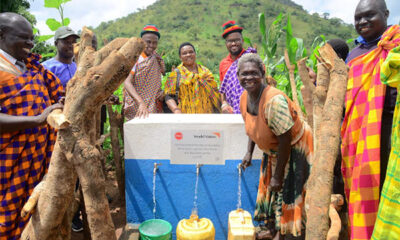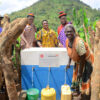Health
Uganda Leads Africa in Global Fight to Eliminate HIV, Hepatitis B, and Syphilis Transmission to Children
Uganda has taken center stage in Africa’s public health transformation as it officially launched the continent’s first High-Level Conference on the Triple Elimination of Mother-to-Child Transmission (MTCT) of HIV, Hepatitis B, and Syphilis. The three-day conference, hosted at Speke Resort Munyonyo, is expected to set the pace for integrated disease elimination across the continent.
While speaking at the ongoing conference, the Minister of Health, Dr. Jane Ruth Aceng, emphasised the urgency and impact of the triple elimination agenda. “This is the first-ever conference of its kind in Africa—and globally. It is our duty to ensure that no child begins life with HIV, syphilis, or Hepatitis B. Eliminating these diseases is not only possible, it is essential,” she said.
Citing recent health data, Dr. Aceng painted a sobering picture of the burden Africa bears: 26.3 million people in Africa are living with HIV, accounting for 65% of the global total. The continent contributes 63% of new global Hepatitis B infections, with 65 million chronically infected. Syphilis infections are also on the rise, with 8 million adults globally affected and 700,000 babies born with congenital syphilis annually. Africa leads in new cases.
Uganda itself records 1.5 million people living with HIV, with 4,700 babies infected annually through vertical transmission, mostly due to mothers contracting HIV during pregnancy or breastfeeding. Syphilis affects 2.1% of the population, while 4.1% of adults and 0.6% of children live with Hepatitis B.
Uganda’s Progress on Triple Elimination
Uganda has been a pioneer in triple elimination efforts, having launched its national plan in 2019. Since then, the country has made significant strides: Sustained HIV testing and maternal ART coverage above 95%. Increased syphilis testing from 57% to 94% and treatment to 83%. Integrated Hepatitis B testing into maternal and child health services, reaching 63% of pregnant women. Introduced innovative point-of-care testing at 323 health facilities, boosting early HIV diagnosis in infants from less than 50% in 2019 to 85% by 2024
“These multiple entry points through antenatal and maternal services give us a unique opportunity to integrate care,” said Dr. Aceng, highlighting how Uganda’s model can serve as a continental blueprint.
Dr. Aceng stressed the importance of cross-sector collaboration in the face of dwindling global funding: “Integration is the way to go now, especially in this era of unprecedented funding challenges. We must bring innovation, research, and manufacturing closer to where the disease burden lies.”
She also extended Uganda’s gratitude to key partners, including the African Union, Africa CDC, WHO, UNICEF, UNAIDS, PEPFAR, Abbott, and PATH, whose support has been critical in organising the conference and sustaining Uganda’s health interventions.
The conference is not only a platform for sharing scientific innovations and policy commitments but also a major turning point in Africa’s health landscape, as leaders commit to ensuring that no child is born with a preventable infection.
“For God and my Country,” the Minister concluded, as the audience—comprised of African health ministers, civil society, and global health partners—rose in applause.
Meanwhile, the Triple Elimination Conference, the first of its kind in Africa, aimed at fast-tracking the elimination of HIV, Hepatitis B, and Syphilis by 2030.
With the theme “Unifying Actions, Transforming Futures: Achieving Triple Elimination in Africa by 2030,” the event signals a major push for integrated health strategies targeting maternal and child health, public health systems, and the continent’s broader development goals.
Comments



























